Super Micro is being accused of fraud by Hindenburg Research and is facing allegations of financial misconduct and sanctions violations.

Hindenburg Research, an investigative reports firm, is making significant allegations against Super Micro Computer Inc., a California-based server manufacturer.
On August 27, Hindenburg issued a report alleging that the company had engaged in financial misconduct, which included the failure to disclose related-party transactions and unlawful revenue recognition.
It is purported that these transactions are advantageous to organizations under the control of Charles Liang’s relatives, Super Micro’s CEO.
Super Micro deals with new allegations of fraud
A report has been published by Hindenburg Research, which has accused Super Micro Computer Inc., a prominent server manufacturer, of engaging in extensive financial malfeasance.
The report claims that the California-based company, which has reaped the rewards of the increasing interest in artificial intelligence technologies, manipulated its accounting practices.
According to reports, these manipulations encompass unlawful revenue recognition and undisclosed related-party transactions, some of which are purportedly associated with companies owned by relatives of Super Micro’s CEO, Charles Liang.
During Hindenburg’s three-month investigation, interviews with former employees and a comprehensive examination of litigation and customs records were conducted. The report highlights numerous “red flags” in the company’s financial reporting, alluding to practices that may have unduly increased the company’s sales, earnings, and profit margins.
Regulatory scrutiny has been applied to Super Micro Computer in the past. The company was delisted from the stock exchange in 2018 due to its inability to submit financial reports on time. The Securities and Exchange Commission (SEC) charged the corporation with widespread accounting violations in 2020. According to reports, these infractions resulted in over $200 million in improper revenue and understated expenses. Subsequently, Super Micro consented to a $17.5 million settlement with the Securities and Exchange Commission.
Despite the AI news spotlight, Hindenburg’s report asserts that Super Micro resumed dubious accounting practices shortly after. The company rehired numerous executives previously implicated in the accounting scandals, as indicated by litigation records and interviews with former employees.
Allegations of Export Control Violations and Sanctions Evasion
The Hindenburg report also accused Super Micro of violating U.S. sanctions by continuing to supply high-tech components to Russia following the country’s invasion of Ukraine.
The report alleges that Super Micro evaded export restrictions by employing third-party distributors, although the company purportedly ceased sales to Russia after the invasion. If confirmed, these actions would comprise severe violations of U.S. export laws and sanctions.
Hindenburg’s investigation further asserts that the company engaged in these activities despite the legal and ethical implications, indicating a more extensive pattern of misconduct.
In other AI News, the technology industry is currently facing regulatory obstacles. Earlier today, Elon Musk expressed his support for California Senate measure 1047, a proposed AI safety measure that would mandate mandatory safety testing for developers who spend more than $100 million on AI models.
Nevertheless, the bill has encountered significant opposition from technology giants such as Google and OpenAI, who contend that it has the potential to stifle innovation and development in the artificial intelligence sector.
